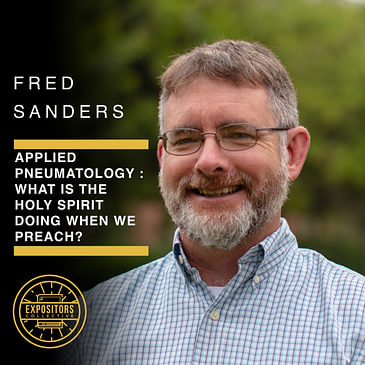Professor, author and lay-preacher Fred Sanders speaks with Mike about what exactly the Holy Spirit is doing as we prepare a sermon, deliver it, and also what He is doing in the hearts, minds and lives of our hearers. He speaks about the second noetic office of the Spirit, the unremarkable sermon that sparked the Asbury Revival and inspiring trends in the preaching landscape today.
You can purchase The Holy Spirit: An Introduction here:
https://www.crossway.org/books/the-holy-spirit-tpb-2/
Fred Sanders is a theologian who studies and teaches across the full range of Christian doctrines, but always with a special focus on the doctrine of the Trinity. Since 1999, Fred has taught in the Torrey Honors College, an undergraduate program in the great books, at Biola University.
Fred studied art (drawing and printmaking) in college, earned an MDiv at Asbury Theological Seminary, and a PhD from the Graduate Theological Union in Berkeley, CA. He and his wife Susan (who have been friends since they met at age 11) are members of Grace Evangelical Free Church in La Mirada, CA. They have two adult children.
Fred has written several books and articles; his most important books are The Deep Things of God: How the Trinity Changes Everything (Crossway, 2010); The Triune God (Zondervan, 2016); and Fountain of Salvation: Trinity and Soteriology (Eerdmans, 2021). He blogs copiously here at fredfredfred.com, with colleagues at scriptoriumdaily.com, and maintains an active presence on Twitter.
Recommended episodes:
Preaching in the Power of the Spirit - Brian Brodersen https://cgnmedia.org/podcast/expositors-collective/episode/preaching-in-the-power-of-the-holy-spirit-with-brian-brodersen
Following the Spirit - Suzy Silk:
https://cgnmedia.org/podcast/expositors-collective/episode/following-the-spirit-suzy-silk
Slowing Down and Opening Up to the Spirit - Dan Hamel:
For information about our upcoming training events visit ExpositorsCollective.com
The Expositors Collective podcast is part of the CGNMedia, Working together to proclaim the Gospel, make disciples, and plant churches. For more content like this, visit https://cgnmedia.org/
Join our private Facebook group to continue the conversation: https://www.facebook.com/groups/ExpositorsCollective






